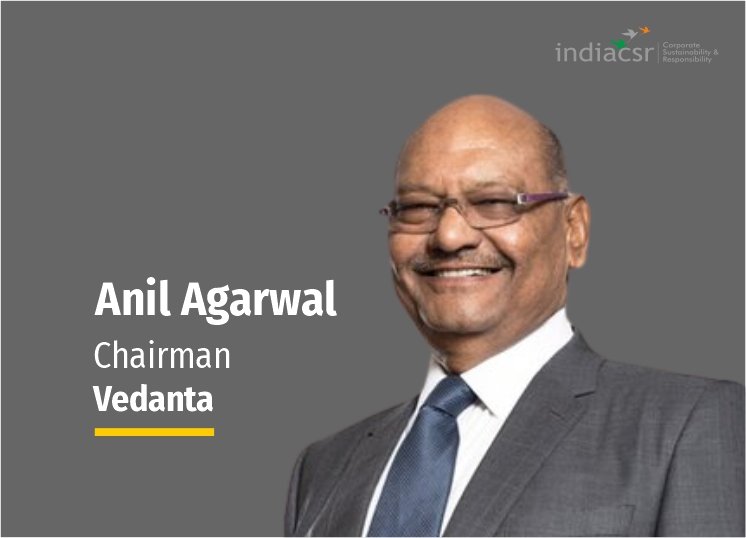NEW DELHI (India CSR): Anil Agarwal-led Vedanta reported a contribution of Rs. 54,165 crores (Rs. 34,562 crores in 2020-21) to the public exchequer by way of paying Corporate Income taxes, royalties, profit petroleum, and other during the year 2021-22. The contribution is around 41% of its turnover.
All data is for the year from 1 April 2021 to 31 March 2022. The contributions have been reported on a cash basis. The information used to compute the contributions is the same as that for the audited financial statements of respective companies with inherent differences in the accounting methodology. The social expenditures have not been considered in the contribution to the exchequer, the company said.
“Vedanta contributed INR 54,165 crores, around 41% of its turnover to the exchequer through a wide range of contributions like Corporate Income taxes, royalties, profit petroleum, through significant indirect revenue contributions by way of withholding taxes and Indirect taxes”, the company said in its seventh Tax Transparency Report.
The company reported the highest ever consolidated Revenue and EBITDA of Rs. 131,192 crores and Rs. 45,319 crores respectively. With an enhanced focus on transparency and commitment to Environmental, Social and Governance (ESG), Vedanta continues to surge ahead to deliver sustainable long-term returns to all its stakeholders.
Types of taxes paid by Vedanta companies include – Government Royalties, Stamp duty, Signature, Discovery & Production Bonuses, Excise Duties, Taxes paid under Amnesty Scheme (Excise Duty, Service Tax), Oil Cess / NCCD, Provident Fund and Employee State Insurance, Withholding taxes, Export License Utilization, Octroi/ Entry Tax and Goods and Service tax.
Also Read: Vedanta contributes over 2.74 Lakh Cr to public exchequer in 10 Years
The company has explained the tax contributions under two broad categories of taxes i.e., Taxes borne and Indirect Contributions.
In the last seven years, Vedanta’s consolidated contribution to the exchequer stands at a whopping Rs 2.65 Lakh Crore.
Vedanta is one of the few corporates that reports key components of a business activities into economic value generated, taxes paid and contribution by each of the verticals.
In the past fiscal, Vedanta generated Direct Economic Value of Rs 141,377 crore, impacting thousands of lives in its operational areas. In terms of direct taxes, the company’s contribution to the exchequer is amongst the top companies in the private sector.
Taxes borne primarily comprise corporate income tax, royalty-related tax payments, production entitlements i.e., profit petroleum and other material payments made to the Government such as production-based Oil Cess, Stamp Duty Payments, Levies on Import/Export, Local Municipal taxes, etc.
Indirect Contributions primarily comprise taxes collected and paid on behalf of employees and vendors i.e. withholding taxes, payroll taxes (professional taxes), payments of value-added taxes on sales and other Social Security Contributions to fund the Social Security program of the governments for the employees, etc.
Company’s oil and gas operations was the largest contributor to the exchequer with a share of Rs 18,539 crore followed by Zinc, which contributed Rs 15,825 crore. Aluminium and copper contributed Rs 7,475 crore and Rs 4,565 crore, respectively.
Government Royalty & Profit Petroleum – 52% – INR 16,697 crores
Government Royalties – INR 8,385 Crores
It paid royalties to the state governments of Gujarat, Punjab, Rajasthan, Andhra Pradesh, Goa and Karnataka in India based on the extraction of bauxite, lead-zinc, silver, iron ore, Crude oil and natural gas. The most significant of these is the royalty that Hindustan Zinc Limited (HZL) is required to pay to the state government of Rajasthan, where all of HZL’s mines are located.
Generally, in respect of oil and gas operations, royalty payments are made by the joint operation partners in proportion to their participating interests. Vedanta being the operator of the block reports the total government royalty paid.
Profit Petroleum – INR 8,312 Crores
The Government of India (GOI) is the owner of the hydrocarbons wherein it has assigned the responsibility to the joint operation (Contractor) to explore, develop and produce the hydrocarbons. The contractor is entitled to recover out of Petroleum produced, all the costs incurred according to the Production Sharing Contracts in exploring, developing and producing the hydrocarbons, which is known as “Cost Petroleum”.
Excess of revenue (value of hydrocarbons produced) over and above the cost incurred as above, is called “Profit Petroleum”, which is shared between the GOI and Contractor Parties as per procedure laid down in Production Sharing Contracts. Vedanta being the operator of the block reports the total profit of petroleum.
Also Read: CSR: Vedanta Spends Rs. 399 Cr. on Community Development in FY 2022
Taxes on Income and capital – 18% – INR 5,721 crores
Profits of companies in India are subject to either regular income tax or Minimum Alternate Tax (“MAT”), whichever is greater. Regular Income tax on Indian companies is charged at a statutory rate of 30.00% plus a surcharge of 12.00% on the tax and has an additional health and education cess of 4.00% on the tax including surcharge, which results in an effective statutory tax rate of 34.94%.
The effective MAT rate during the year for Indian companies was 17.47%. The excess of amounts paid as MAT over the regular income tax amount during the year may be carried forward and applied towards regular income taxes payable in any of the succeeding fifteen years subject to certain conditions.
Other indirect contributions – 10% – INR 1,994 crores
Indirect Taxes -76% – INR 14,899 crores
Goods and Service Tax (GST) is a supply-driven concept and would therefore apply to the supply of goods and services.
Taxes under GST apply as follows:
Central goods and services tax and state goods and services tax are simultaneously levied on the intra-state supply of goods and services.
Integrated goods and service taxes are levied on imports and inter-state supply of goods and services.
In addition, the GST compensation cess also applies to certain specified goods and services. The general rate of GST on output supplies is 18.00%, 5.00% and 3.00%
Withholding taxes – 14% – INR 2,772 crores
(India CSR)







